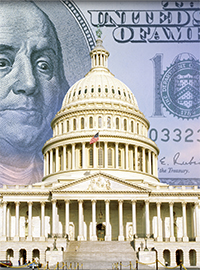| One Stat Rarely Tells the Story |
 |
|
By Veronique de Rugy
Thursday, April 20 2023 |
Government debt as a share of the U.S. economy is falling. This must mean the Biden administration and Congress are practicing fiscal responsibility, right? No, it doesn't. The main driver behind the reduction is inflation – inflation that politicians in Washington created with their irresponsible spending and refusal to engage in austerity after the COVID-19 crisis. Misleading ideas like this are another reason why we must keep talking about fiscal policy. The missing debt is nothing to celebrate when it's due to inflation, something especially harmful for poorer Americans who see their living standards erode. All of this might sound complicated, but the solution is not. During the pandemic, government debt rose to 104% of GDP, a level not seen in decades, but it's since fallen to less than 94%. Is this progress? The president likes to call himself a big deficit cutter. However, here are the facts: Public debt since 2020 has grown by $3 trillion. According to the latest Monthly Treasury report, government spending in March of 2023 alone was twice the revenue collected. The deficit in the first six months of fiscal year 2023 is about 80% as large as the deficit for the entire FY2022. Our mid-year deficit is $1.1 trillion, compared to $667 billion at the same point last year. Falling revenue collection is responsible for only 17% of this difference. The other 83% is overwhelmingly due to excessive and increased spending. In simpler terms, the decline in the debt-to-GDP ratio cannot be attributed to spending cuts, even as we move away from what's now widely regarded as an excessive fiscal response to the pandemic. The administration's handling of this post-emergency phase is unusual. In the past, there was a clear understanding that while spending, deficits and debt would grow during an emergency, spending reduction and other forms of austerity would be necessary afterward. These were implicit fiscal norms that authorities on the Right and the Left understood and lived by. However, rather than reducing spending and engaging in serious post-emergency fiscal adjustments, the Biden administration fought against the expiration of emergency programs and passed large spending increases, leading to much faster deficit growth than there should have been and the highest spike in inflation in 40 years. It's the inflation, which came as a surprise to so many, that's led to the decrease in the debt-to-GDP ratio. According to an International Monetary Fund (IMF) fiscal monitor study, in countries with debt-to-GDP over 50%, for every 1 percentage point of unexpected inflation, the debt ratio will be reduced by 0.6 percentage points. This perfectly explains most of the debt-ratio decline. Still, isn't that good news for the government? Yes and no. On one hand, it allows politicians to take credit for debt reduction without cutting spending. On the other hand, we're all feeling the pain of inflation. For example, it means a reduction in real wages, as we've seen in the last two years, especially for nonsupervisory workers. In addition, the Federal Reserve has tried to fight inflation by raising interest rates. That's caused some bank instability, as people had been living by the myth that rates would never go up. Also, as Jack Salmon of the Philanthropy Roundtable notes, "rising interest rates mean that debt servicing costs hit a new high of 2.41% of GDP (annualized) in March." That grows the federal government's interest payments and the deficit. The increasing cost of borrowing is itself inflationary. Inflationary expectations breed even more inflation, and on and on the cycle goes. There is a path out of this mess. It requires reducing the debt for real – not through another cycle of spending and inflation, but through fiscal adjustments. Once more, the IMF highlights the answer: "For advanced economies ... reducing public expenditure by 1 percentage point of GDP lowers inflation by about half a percentage point." Salmon adds that returning this measurement to 2019 levels could shave 2 percentage points off of inflation, and returning to 2000-2001 levels could shave off 3.5 percentage points. Spending cuts are not just the most effective way to reduce the debt-to-GDP ratio, as the late economist Alberto Alesina has shown, but fighting inflation would also benefit the poor the most. The Biden administration has inadvertently reduced the debt-to-GDP ratio. But it has done it in the worse possible way, refusing to heed warnings of an inflation debacle and instill some fiscal common sense. This has made the work of the Fed harder, if not impossible, and life more difficult for rich and poor Americans alike. Veronique de Rugy is the George Gibbs Chair in Political Economy and a senior research fellow at the Mercatus Center at George Mason University. COPYRIGHT 2023 CREATORS.COM |
Related Articles : |
























